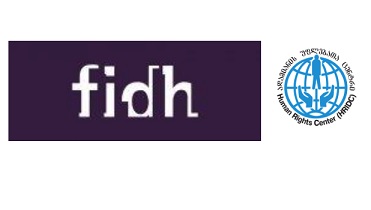Russia-Georgia war: The European Court of Human Rights deliberates Georgia’s claims as ICC is urged to move quicker with its own investigation
May 25, 2018

(Paris-Hague-Moscow-Tbilisi) Yesterday, the hearing was held in the Grand Chamber of the European Court of Human Rights (ECtHR) under an application lodged by the government of Georgia against the Russian Federation in the context of the armed conflict of August 2008. It is one of the few inter-state cases lodged with the Court that usually deals with individual complaints. Hundreds of individual applications are awaiting ECtHR decision while it hears the inter-State case.
ECtHR will have to examine whether, in the context of the 2008 armed conflict, Russia or the separatist forces under their control, in violation of its obligations under the European Convention of Human Rights, led indiscriminate and disproportionate attacks against civilians in Georgia, who were consequently injured, killed, detained or went missing, thousands of civilians had their property and homes destroyed and thousands were forced to leave Abkhazia and South Ossetia. The ECtHR will have to determine whether the right to life, prohibition of torture, rights to liberty, security, privacy and family life, the right to property and the freedom of movement were violated by the Russian Federation.
Since the conflict, Russia merged its border patrol agency with that of South Ossetia, hereby deploying its officers at the administrative boundary between de facto South Ossetia and Georgia. As FIDH and its member organisation in Georgia, Human Rights Center (HRIDC), demonstrate in their report released this year, the latter administrative boundary line continues to be a source of insecurity and permanent concern for Georgians who live near the region of South Ossetia. This demarcation line is not sufficiently marked: it shifts constantly and is progressively infringed upon by the de facto South Ossetian authorities.
"While the European Court of Human Rights hears the case which concerns the grave violations of rights of thousands of people, people living on the both sides of administrative boundary line are still waiting for the execution of justice for the loss that they have suffered during the 2008 August War, the consequences of which are still felt today. We hope that the review of the case shall fasten the investigation of the ICC in order to bring individual perpetrators to justice" Aleko Tskitishvili, executive director of Human Rights Center.
Indeed, for the last two years, the ICC has been investigating war crimes and crimes against humanity allegedly committed by the three main parties to the conflict - the Georgian armed forces, the South Ossetian de facto forces and the Russian armed forces - in and around South Ossetia from 1 July 2008 to 10 October 2008. FIDH and its partners in Russia and Georgia recently called upon the ICC to dedicate the necessary resources and adopt prosecutorial and outreach strategies for the Georgia investigation that would bring the ICC to take concrete steps towards the issuance of arrest warrants and to effectively reach out to victims and affected communities.
"While the ECtHR and the ICC have different mandates since the ICC investigates international crimes committed by all sides of the conflict and prosecutes individuals and not states as the European Court of Human Rights, the proceeding with the case in the latter will probably be scrutinized by the ICC and impact the evolution of its future prosecutions"
FIDH President Dimitris Christopoulos.
Context
The Georgia-Russia armed conflict in the summer of 2008 saw attacks against the civilian population, which resulted in murders, forcible transfers of population, persecutions on ethnic grounds, the destruction of property, and pillaging. The conflict resulted in more than 800 deaths and thousands of displaced persons.
The application by the Georgian government was submitted to the European Court of Human Rights on 12 August 2008, the same day Russia halted its military incursion into Georgian uncontested territory and agreed to a peace deal brokered by the then-French President Nicolas Sarkozy.
FIDH undertook several missions to Georgia. In close collaboration with its member organisation, the Human Rights Center, FIDH recently published a report "Living on the edge: victims’ quest for accountability – The ongoing impact of the 2008 Russia-Georgia war" which was presented in Tbilisi and Gori in February 2018, and in The Hague in April 2018.
News
December 13, 2023
Ethnic minorities outside the peace dialogue
November 6, 2023
‘Peace’ agenda of political parties
Popular
Articles
February 13, 2024



